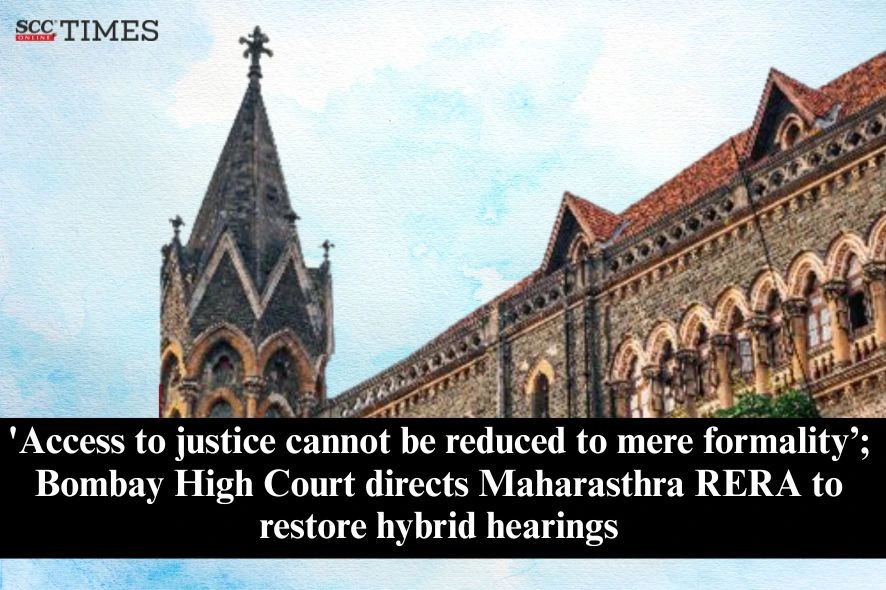Bombay High Court: In a writ petition seeking to streamline the process of execution of orders passed by the Maharashtra Real Estate Regulatory Authority (‘Maha RERA’) and to provide a mechanism for mentioning matters, conduct hearings immediately after filing of execution proceedings and expeditious disposal of execution proceedings, the Division Bench comprising of Revati Mohite Dere* and Dr. Neela Gokhale, JJ., emphasised that the objective of Real Estate Regulatory Authority (‘RERA’) and Maha RERA is to provide speedy, transparent, and effective adjudication of disputes in the real estate sector.
The Court stated that virtual-only hearings, when coupled with the inability to communicate effectively or mention urgent matters, result in systemic opacity and procedural delays. Thus, the Court issued certain directions to Maha RERA, including direction to restore hybrid hearings, permitting parties to opt for either physical or virtual appearance.
Background
It was contended by the petitioners that there was no structured mechanism in place for disposal of execution/non-compliance of proceedings in respect of the orders passed by the Authority. Further, there was not any mechanism for getting a matter listed on a specified/certain date, in any proceeding before the Authority, due to which even after the parties got an order in their favour , they were unable to bear the fruits of the order, for want of effective execution of the same, which often resulted in the advantage of the builders/promoters/ developers.
It was also mentioned that if once a matter was listed and the complainant refused conciliation, it was adjourned with a direction to be listed `as per seniority’, which, in some cases, resulted in a delay of over a year before the matter was relisted, thereby frustrating the very object of the Act.
It was pointed out by the petitioners that prior to the COVID-19 pandemic, the Authority was functioning physically, and the parties/ advocates had the opportunity to appear in-person before the Authority. However, post COVID-19, Maha RERA continued to function entirely through virtual hearings only, and if the parties desired to have physical hearing, an application for the same had to be submitted before the respective Bench.
Analysis, Law and Decision
The Court expressed concerns regarding the Authority’s continued insistence on a virtual-only model and the resistance of Maha RERA to commence hybrid hearing, despite the availability of both physical and virtual infrastructure.
The Court also observed that the Seniority Circular issued by Maha RERA, cannot be the sole basis for determining urgency, and there might be other reasons warranting listing. Matters involving non-compliance, serious prejudice, or impending irreparable harm might require immediate attention, irrespective of their position in the seniority list. A rigid adherence to chronology, without a mechanism for urgent mentioning or timely listing, risks defeating the very objective of the Real Estate (Regulation and Development) Act, 2016 (‘the Act’), namely, expeditious and effective redressal of grievances.
Furthermore, it was pointed out by the Court that the unavailability of a hybrid hearing mechanism may lead to slower disposal rates, increased case pendency, and ultimately, defeat the very purpose of the Act, which is the expeditious resolution of disputes. Additionally, the present mode of communication with the Authorities is unilateral, offering little to no opportunity for the parties to effectively present or clarify their case.
Relying upon the judgement of the Supreme Court in the case of Sarvesh Mathur v. High Court of Punjab and Haryana, 2023 SCC OnLine SC 1293 (‘Sarvesh Mathur case’), the Court reiterated that access to virtual hearings alone is insufficient; denial of physical hearing, even when facilities exist, amounts to an unreasonable fetter on litigants’ rights. The ability to choose one’s mode of hearing is integral to access to justice.
Accordingly, the Court gave following directions to Maha RERA:
- To restore the facility of hybrid hearings, permitting parties to opt for either physical or virtual appearance, as per their convenience, within 4 weeks;
- To consider revisiting Circular dated 8-4-2025 and its Standard Operating Procedures, particularly with respect to the mechanism for urgent listing of matters; execution of non-compliance orders; mentioning of cases (physically and virtually) and pronouncement and publication of reserved orders.
- To implement the guidelines given by the Supreme Court in the Sarvesh Mathur case (supra) with respect to the hybrid hearing model of Courts and Tribunals.
- Maintain a register of praecipes submitted for circulation, production, or urgent listing, and record the acceptance/rejection of such applications;
- To upload its orders with a timestamp indicating the date and time of upload;
- Assign fixed dates for hearings and, in the event of an adjournment, indicate the next date of hearing;
-
Maha RERA shall place in the public domain, through its website, the relevant procedures and contact information in a functional and transparent manner.
[Mayur L. Desai v. State of Maharashtra, 2025 SCC OnLine Bom 2736, decided on: 24-7-2025]
*Judgement authored by- Justice Revati Mohite Dere
Advocates who appeared in this case:
Advocate for the Petitioners- Aseem Naphade, Chitrangada Singh, Advocates
Advocate for the Respondents- Vaishali Choudhari, Addl. G.P, Madhura Deshmukh, A.G.P, Ravi Adsure, A.K. Saxena, Prakash Sabale, Advocates


